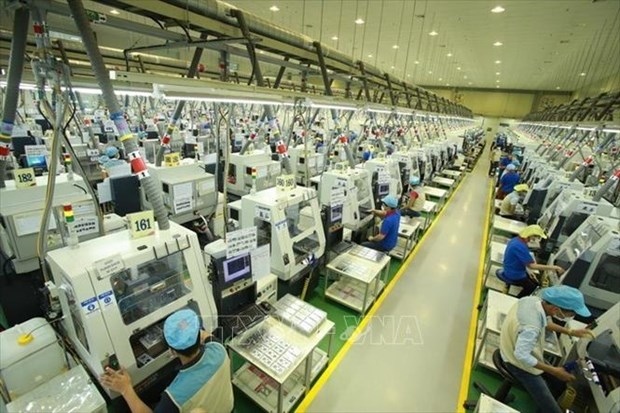Aussie magazine names driving forces for Vietnam’s economy
Fundamental factors that help the Vietnamese economy respond to current challenges, especially the impacts of COVID-19, were discussed in an article by senior journalist Cameron Cooper published on the intheblack.com business news site of Australia.

The article cited as an example a story of Ho Chi Minh City-based entrepreneur Jewel Nguyen. As many trading companies battle the effects of the COVID-19 pandemic, she is being rushed off her feet with orders, it said.
In the past year, her business Viego Global has been in negotiations with hundreds of distributors, resellers and brokers for supplies of products such as coffee, coconuts, textiles and pharmaceuticals. She’s fielded inquiries from markets including the US, Saudi Arabia, Iran, the Republic of Korea (RoK) and the Caribbean region. Not bad for a start-up, the author commented.
The company’s founder and CEO said that all of the customers are new. She attributes the company’s success, in part, to taking advantage of digital marketing to acquire new customers.
“The quick commercial success of Viego Global’s team reflects business confidence in Vietnam, which has seen the South-East Asian nation outperform most countries during the pandemic,” wrote the article.
The Lowy Institute, a Sydney-based think tank, has crunched data to rank the pandemic response of almost 100 markets, placing New Zealand in top spot, with Vietnam coming second.
The female entrepreneur said such positives are also encouraging highly trained graduates, professionals and other Vietnamese living abroad to return home and contribute to the country.
With businesses in the services and logistics space in particular bouncing back strongly from the impacts of COVID-19, the World Bank has estimated 6% to 6.5% economic growth for Vietnam in 2021, the article continued.
However, a recent surge in COVID-19 infections could affect this projection.
Warrick Cleine, CEO of KPMG in Vietnam, puts the success down to three key factors.
First, throughout 2020 and early 2021, Vietnam managed COVID-19 border controls and contact tracing better than most countries.
Vietnam is benefitting from more than two decades as a serious player in global trade and manufacturing. In addition, the country is less reliant on tourism than its neighbours.
Finally, Vietnam’s youthful population is fuelling a powerful domestic economy that has proven to be a buffer against the global slowdown. “Everybody’s young and getting jobs in an incredibly productive workforce,” the article quoted Cleine as saying.
Vietnam also attracts a new generation of foreign manufacturers.
The article quoted Michael Kokalari, chief economist at investment firm VinaCapital, as saying that he cannot see any immediate threats to Vietnam’s manufacturing power from its Southeast Asian neighbours.
Wages in Vietnam are much lower than in Thailand, for instance. Meanwhile, logistics bottlenecks are an issue for Indonesia, and high costs and an ageing workforce are the challenges facing Malaysia.
Kokalari went on saying that Vietnam can also keep drawing cheap labour from the agricultural sector, which still accounts for about 45% of all workers.
The article pointed out that a rapidly growing middle class, with increasing discretionary incomes, is fuelling domestic consumption in Vietnam.
The Australian Trade and Investment Commission (Austrade) envisions opportunities for Australian exporters in areas as diverse as energy, health and premium food and beverages.
Shannon Leahy, the Austrade trade commissioner in Hanoi, referred to Vietnam’s consumer market as a bright spot for investors, noting that the nation has one of the fastest-growing e-commerce markets in the region.
“The pandemic has accelerated trends in technology disruption within Vietnam, creating opportunities for Australia’s digitech and healthtech companies,” he added.
Similarly, Vietnam’s banks are embracing emerging fintech players, while in the health sector, private hospital networks across the country are leapfrogging technology phases, with data management going straight from paper to cloud computing.
While Vietnam’s tourism industry has been hit hard by the pandemic, Vietnam’s consumer market remains strong, driving opportunities for Australia’s agrifood industry, particularly in most premium food segments, including in meat, dairy, nuts and seafood, Leahy stated.
Furthermore, the Vietnamese Government has been issuing favourable laws and regulations in an effort to further improve the business and investment climate.
As analysts debate whether Vietnam’s golden run can continue, Kokalari drew confidence from demographic and investment analyses of Japan and the RoK.
He also mentioned that facing lower growth and a shortage of productive workers, the two Asian powerhouses have poured foreign direct investment into Vietnamese manufacturing plants in search of new opportunities.
They have a structural need to invest outside their countries into places like Vietnam, the expert said.
